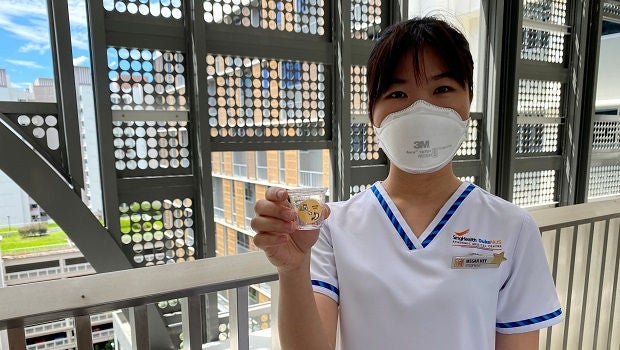HealthXchange will NEVER ask you to transfer money over a call. If in doubt, call the 24/7 ScamShield helpline at 1799, or visit the ScamShield website at www.scamshield.gov.sg.

Kaizen refers to the process of continuous improvement, based on the idea that small, ongoing changes can reap significant improvements. At Sengkang General Hospital (SKH), staff are encouraged to come up with gradual and small improvements to problems that can be quickly implemented. Over time, we believe that each incremental improvement at SKH can certainly add up to a great overall impact on our quality commitment to patients.
When Senior Staff Nurse (SSN) Megan Hey from SKH Ward 18 noticed that patients were not taking their pre-meal medications before their meals, she and a colleague worked together and applied the “kaizen” process to come up with a simple solution for the potential issue. Although pre and post-meal medications were separated into different medication cups, the cups had no distinct differences. SSN Megan and her colleague observed that this resulted in confusion for the patients – “which medication should I be taking now?” Moreover, some nurses experienced language barriers and faced challenges in communicating medication instructions to their patients.
After brainstorming for ideas, SSN Megan and her colleague came up with the simple idea of setting apart the design of the medication cups. A coloured sticker with pictorial descriptions was added to the medication cups that contained pre-meal medications, to distinguish them from the unmodified cups, which contained the post-meal medications.

SSN Megan and her colleague introduced gradual improvements to the medication cup that contains pre-meal medications, to distinguish it from the cup without sticker that contains post-meal medications. They first used a blue background, then changed it to yellow for better colour-contrast. Following feedback from patients, they are now looking into enlarging the text and coming up with a Mandarin version.
“We first implemented the improvement in Ward 18 between May to June this year. Patients shared that the stickers were easy to understand and are helpful to discern which medications to take before and after meals. We received feedback that the font sizes on the cups were a little small. These were valuable feedback that helped us continue to make the gradual enhancements to the sticker designs on the medication cups. We also thought about incorporating a Mandarin translation and are thinking about how we can take this project further for a hospital-wide implementation,” SSN Megan shared.
Drugs are typically prescribed before or after meals as food intake could influence its absorption into the body and thus affect the drug’s efficacy. By applying a small improvement to the design of the pre-meal medication cups, SSN Megan and her colleague took a step forward in ensuring the best care for our patients.
This article originally appeared on What's Up @ SKH.
Get the Health Buddy App
© 2025 SingHealth Group. All Rights Reserved.













 Get it on Google Play
Get it on Google Play